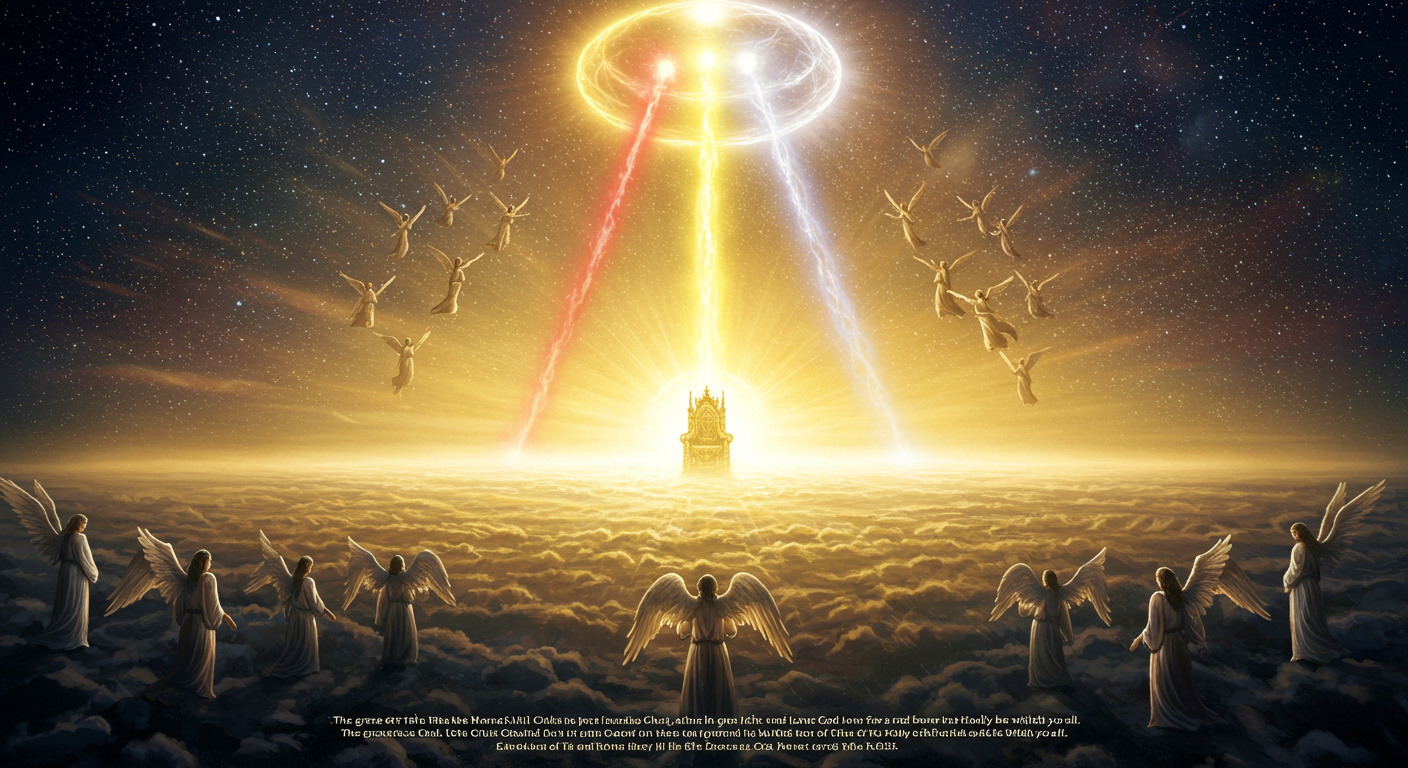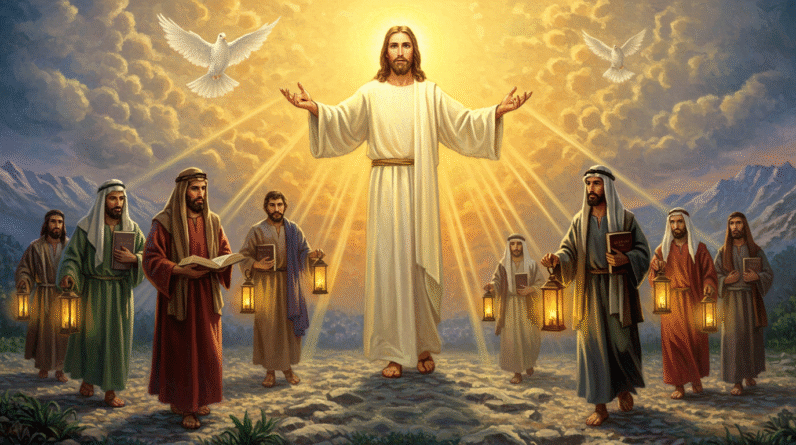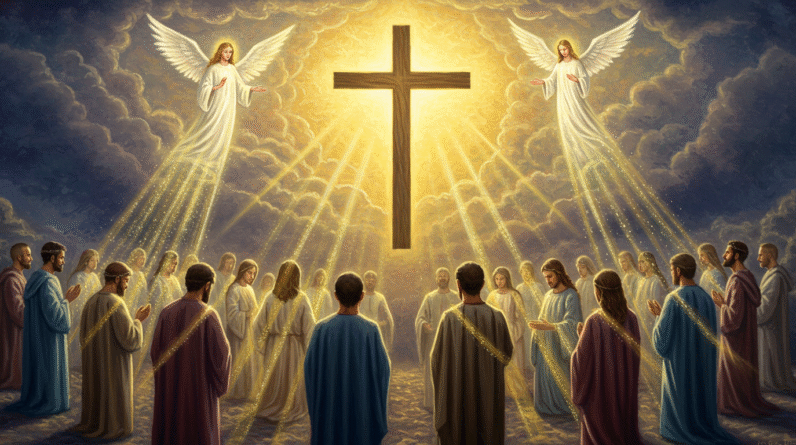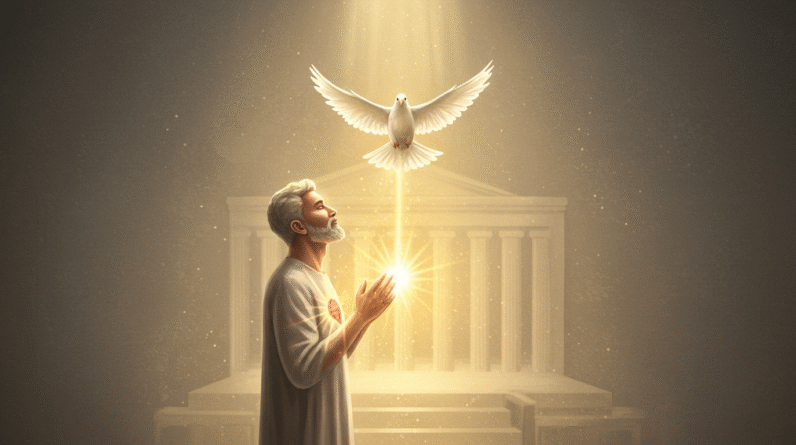The Trinity In Eternity (2 Corinthians 13:14)
You may have heard the benediction of 2 Corinthians 13:14 read at the close of a service and wondered what depth lies behind those familiar words. The apostle Paul writes, “May the grace of the Lord Jesus Christ, and the love of God, and the fellowship of the Holy Spirit be with you all.” When you read that blessing slowly, it opens a window into the eternal fellowship of the Father, the Son, and the Holy Spirit. This is not just a theological abstraction; it is the heart of who God is and the way He reaches into your life. 2 Corinthians 13:14 shows you a concise, pastoral summary of the Trinity — a threefold expression of God that has been at work in eternity past, throughout creation, and in your salvation today.
Why this matters to you
You live your days with questions, burdens, hopes, and needs. The biblical revelation of Father, Son, and Holy Spirit is not merely an academic doctrine; it is the living reality of a God who knows you, saves you, and communes with you. The Trinity describes how God relates within Himself and how He relates to you. When you begin to see the Father who loves, the Son who saves, and the Spirit who dwells with you, your faith deepens — your worship becomes richer and your confidence in prayer becomes firmer.
The Trinity in Scripture: One God, Three Persons
When you open the Bible and read carefully, you discover that Scripture speaks of one God who reveals Himself in three persons. This is not a later invention but the conclusion Scripture leads you to when you consider its consistent witness. In the opening of John’s Gospel you read that “the Word was with God, and the Word was God” and that through the Word all things were made. That points you to a divine Son who is present and active in eternity past and in creation. See John 1:1-3 to follow that thought.
You also read Genesis where God says, “Let us make mankind in our image,” a mysterious plurality in the one Godhead that foreshadows the relational reality of Father, Son, and Spirit. Pay attention to Genesis 1:26 and the Spirit’s presence at creation in Genesis 1:1-2. These passages together show you that the God who creates is not a solitary monad but a God who exists in relationship.
The New Testament is equally clear. Jesus sends His disciples with the authority of the triune name: “baptizing them in the name of the Father and of the Son and of the Holy Spirit.” That command points you to the threefold God who participates equally in the life of the believer. See Matthew 28:19. Paul, writing with pastoral clarity, lists distinctions and unity in passages like Ephesians 4:4-6, reminding you that there is one Spirit, one Lord, one God and Father of all.
2 Corinthians 13:14: A Window into Eternal Fellowship
When you read the words of Paul’s benediction, you can unpack them phrase by phrase and see how the Trinity is portrayed in eternity and poured out into time. The threefold greeting — grace, love, fellowship — corresponds to the roles and actions of each Person of the Godhead, while at the same time affirming their unity in the life of the believer. Read 2 Corinthians 13:14 again, slowly, and let each phrase settle in your heart.
First, “the grace of the Lord Jesus Christ” points you to the Son’s redemptive work. Grace speaks of unmerited favor, the gift of salvation offered through Jesus’ life, death, and resurrection. As you reflect on the grace that comes from Jesus, you keep your eyes on the Cross and on the One who humbled Himself for your sake. Scripture is full of witnesses to Jesus’ redemptive lordship, and the Gospel writers remind you that in Christ you have forgiveness and reconciliation. See the witness of Philippians 2:6-11 on the humility and exaltation of the Son, and the cosmic implications of His work in Colossians 1:15-17.
Second, “the love of God” is a profound affirmation of the Father’s character. When you think of the Father’s love, think of the initiative: He loved you and sent His Son for your salvation. The famous verse John 3:16 captures that sending-love simply and powerfully. The Father’s love is not abstract; it’s a holy, active love that sends the Son into the world for the sake of sinners. It is the love that pursues you and will not let you go.
Third, “the fellowship of the Holy Spirit” reminds you that it is the Spirit who unites and dwells with believers, producing communion with God and with one another. The Spirit’s presence makes your relationship personal and experiential. He is the one who guides, comforts, convinces, and binds the church together. Consider the Spirit’s promised presence in John 14:16-17, His role as Teacher in John 14:26, and as the One who testifies to Christ in John 15:26.
The Eternal Relations of Father, Son, and Holy Spirit
As you look more closely at Scripture, it becomes clear that the Father, Son, and Holy Spirit have eternal relations among themselves long before creation. The Son speaks of a glory He shared with the Father “before the world existed” — that phrase points you to a pre-incarnate life, a shared glory that is part of the eternal relationship of the Persons of the Trinity. See John 17:5 and John 17:24 for Jesus’ own testimony about His relationship with the Father before the world began.
The Spirit’s procession and work are likewise spoken of as eternal. He proceeds to be the Comforter and Helper, sent by the Father and the Son, revealing the truth of God and applying the work of Christ to your heart. The Spirit’s eternal relationship with the Father and the Son is seen in Jesus’ promise to send the Spirit in His name, so that He will be with you and in you forever. See John 14:16-17 and John 14:26.
When you study these relationships, you discover the doctrine often described with the technical terms “eternal generation” (the Son from the Father) and “procession” (the Spirit from the Father and/or the Son). You don’t need to get lost in theological jargon to be comforted: the essential truth you must cling to is that the Trinity is not a temporary arrangement; it is the eternal, loving fellowship of three persons who are one God.
Biblical Scenes That Reveal the Trinity at Work
You can point to key moments in Scripture where the three Persons appear together, each distinct yet united in purpose. These scenes help you see the Trinity in action and remind you that God’s triune life touches every part of salvation history.
- Creation: The eternal Son is the agent of creation, and the Spirit hovers over the formless earth. See John 1:1-3 and Genesis 1:1-2.
- The Baptism of Jesus: At the Jorda,n you see the Son baptized, the Spirit descending like a dove, and the Father’s voice declaring pleasure in His Son. See Matthew 3:16-17.
- The Great Commission: Jesus sends His disciples in the authority of Father, Son, and Holy Spirit, triune commissioning for mission. See Matthew 28:19.
- Pentecost: The Spirit falls and empowers the church, continuing the work of Christ and the will of the Father. See Acts 2:1-4.
These scenes, when you reflect on them, show you that the Trinity is not an idea tucked away in theological treatises. The Trinity is God acting and revealing Himself in history for your good and for your salvation.
Distinctions Without Division: Understanding Persons and Essence
You might be tempted to think that because the Father, Son, and Holy Spirit are distinct persons, they must be separate gods. Scripture will not allow that conclusion. The Bible insists on the unity of God’s essence even as it distinguishes persons. You see that unity in the constant affirmation that there is one Lord and one God, and you see distinction in the interactions among Father, Son, and Spirit.
A few passages illustrate this clearly. When the disciples are baptized into the triune name, Jesus gives them a single name — not three separate gods but one name that carries the divine authority of Father, Son, and Holy Spirit together. See Matthew 28:19. At Jesus’ baptism, the three Persons are present and distinct: the Son is baptized, the Spirit descends, and the Father speaks from heaven. See Matthew 3:16-17. And after Christ’s resurrection, He breathes the Holy Spirit on the disciples and sends them into mission, showing the interplay of Persons in the economy of redemption. See John 20:19-22.
At the same time, Scripture warns against attributing to the Spirit something that is not God. When Ananias lies to the Holy Spirit, Peter says he has lied to God. That is a strong textual affirmation that the Spirit is fully God. See Acts 5:3-4. The biblical witness refuses both the error of modalism — the idea that God merely wears three masks — and the error of tritheism — the idea that there are three gods. You must hold together distinction and unity because Scripture does so.
The Trinity and Eternity: Co-equal, Co-eternal, Co-existent
You may wonder what it means to say the Trinity is eternal. When theologians say that the Father, Son, and Holy Spirit are co-equal and co-eternal, they mean the following simply: there was never a time when any Person did not exist, and none of the three is inferior in divine essence to the others. Scripture supports this in multiple ways. The Word (the Son) is with God and is God in the beginning, before creation, pointing you to the Son’s eternal existence alongside the Father. See John 1:1-3.
Jesus’ own prayer about having glory with the Father “before the world existed” tells you that His personhood and relationship to the Father are not created. See John 17:5. The Spirit’s role as the eternal Comforter and witness is likewise portrayed as part of the God who acts from eternity, not merely a created force. The apostle Paul reminds you that the Lord Jesus Christ is distinct and yet eternal in His lordship; Jesus is the same yesterday, today, and forever, a truth that anchors your faith in an unchanging Savior. See Hebrews 13:8.
The unity and shared divine essence of the three Persons is also visible in Revelation, where God declares Himself the Alpha and the Omega — and Jesus claims the same titles in the book of Revelation, pointing you to the reality that the Son shares in the divine eternity. See Revelation 1:8 and related texts.

The Trinity and Creation: Triune Work Before Time
When you reflect on creation, you see the Trinity at work before anything else existed. The Father speaks, the Son is the Word through whom things were made, and the Spirit moves over the waters. That triune action shows you that the life of the Godhead is prior to and independent of creation. Read Genesis 1:1-2 together with John 1:1-3, and you’ll discover a beautiful consistency: the same God who is Father, Son, and Spirit is the Creator.
Because creation is the work of the triune God, everything that exists owes its being to the relational life of God. You are not an accident. You exist because the triune God spoke and willed you into being. And because the Persons of the Trinity share a common will and purpose, creation is the arena where God’s eternal love and plan begin to unfold in time. That truth ought to humble and comfort you: your life is held within the hands of a triune God who made and sustains you.
The Trinity in Salvation: How God Saves You
When it comes to your salvation, each Person of the Trinity plays a vital part. The Father’s love initiates, the Son accomplishes, and the Spirit applies. This triune economy is at the heart of Paul’s blessing: grace from Jesus, love from the Father, fellowship from the Spirit. Your salvation is not a one-person show; it is the joint work of the triune God.
The Father plans salvation in love, as Scripture testifies. Read verses like John 3:16 and remember that the sending originates in the Father’s heart. The Son became flesh, lived among you, and bore the penalty for sin so that you might be reconciled; for the fullness of His humanity and deity see Philippians 2:6-11 and Colossians 2:9. The Spirit applies Christ’s work to your heart: He convicts you of sin, regenerates you, indwells you, and sustains you by power. See Romans 8:9-11 and Titus 3:4-6.
Because the Trinity works together in salvation, you may confidently approach the throne of grace. You come to the Father through the Son and by the power of the Spirit. That is not merely an elegant theological diagram; it is the way God rescues you and makes you His child.
Prayer, Worship, and the Trinity in Your Daily Life
You will find that your prayer life and worship are enriched when you live with a trinitarian understanding of God. You pray to the Father, you pray in the name of Jesus, and you pray in the power of the Holy Spirit. This pattern is rooted in Scripture and gives you a fuller, more biblical way to approach God. See Ephesians 2:18, which tells you that through Chris,t you have access to the Father by one Spirit.
Worship becomes more profound when you remember that the Father’s love, the Son’s grace, and the Spirit’s fellowship are all present and active. The Spirit teaches you and brings Christ’s presence to your heart while the Father receives your worship as a pleasing offering. Jesus promised that the Spirit would be your Advocate and Teacher, guiding you into truth and helping you to pray. See John 14:26 and John 14:16-17.
You’ll also discover that a trinitarian faith shapes how you relate to others. The fellowship of the Holy Spirit binds believers into one family so that your communal life becomes an expression of the Trinity’s unity and diversity. When you gather with other Christians, the Spirit draws you together, and you experience a foretaste of the eternal communion of the triune God.
Practical Steps for Living with the Trinity in Your Heart
You don’t need to become a theologian to live in the light of the Trinity. Here are a few simple, practical steps you can take to let this truth shape your Christian walk:
- Pray with intentional trinitarian awareness: address the Father, come in the name of Jesus, and ask the Spirit to guide you. Keep Romans 8:15-16 in mind as you approach the Father with the Spirit’s witness.
- Read Scriptures that highlight each Person: meditate on the Father’s love, the Son’s work, and the Spirit’s indwelling presence. Use passages like John 3:16, Colossians 1:15-17, and Romans 8:9-11.
- Live in community: allow the fellowship of the Spirit to shape how you relate to other believers. The Spirit unites diverse people into one body, as you can read in 1 Corinthians 12:4-6.
These simple practices will help you experience the Trinity not as an abstract doctrine, but as a personal reality that sustains and transforms your life.
Addressing Common Questions and Misunderstandings
You might have genuine questions or doubts — that’s normal and healthy. Many people struggle to understand how God can be both one and three. The important thing is to turn to Scripture rather than speculation. The Bible refuses both tritheism (three gods) and modalism (one God wearing three masks). The scriptural balance affirms one divine essence and three distinct persons.
If you worry that honoring three Persons somehow dilutes worship or confuses allegiance, remember that the New Testament consistently shows worship directed to the one God — Father, Son, and Holy Spirit — each fully divine. When Peter confronts Ananias for lying to the Holy Spirit, he equates lying to the Spirit with lying to God, showing the Spirit’s deity. See Acts 5:3-4. Likewise, the Father and the Son are both objects of worship and prayer without contradiction. The distinction is relational and personal, not ontological in a way that divides God.
If you’re tempted to simplify by saying “God just appears in different ways,” you will lose the personal relationships Scripture reveals among the Persons. At the same time, if you insist they are three separate gods, you deny the foundational biblical claim of God’s oneness. The Bible holds these two truths together in a way that invites your faith, not your intellectual triumph.
Pastoral Reflection: The Comfort of the Triune God
If you’re tired or burdened today, remember that the triune God is intimately involved with you. The Father’s love surrounds you. The Son’s grace saves you. The Spirit’s fellowship sustains you. Paul’s benediction is not an abstract theological formula; it is a prayer meant to bring you comfort and assurance. Revisit 2 Corinthians 13:14 and let its phrases settle into your soul.
There is profound consolation in the fact that you are not left alone. The Spirit dwells in you, testifying to your status as God’s child. See Romans 8:9-11. When you approach the throne of grace, you come to the Father through the Son and the Spirit helps your weakness in prayer. Hold fast to the promise that God is with you and for you. Paul reminds you elsewhere that the God of all comfort comforts you in all your troubles so that you can comfort others; this is the Father’s heart and the Spirit’s work among you. See 2 Corinthians 1:3-4.
Concluding Appeal: Respond to the Triune God
If you have never turned to Jesus, this triune revelation leads you to a simple, life-changing response. Salvation involves turning to the Father, trusting in the Son, and receiving the empowering presence of the Spirit. The apostle Paul says that if you confess with your mouth that Jesus is Lord and believe in your heart that God raised Him from the dead, you will be saved. See Romans 10:9. Don’t let the doctrine intimidate you; let it invite you. The Father loves you, the Son has made a way for you, and the Spirit is ready to dwell in you.
If you already follow Christ, let the Trinity shape the way you live, pray, and serve. Let your worship reflect the Father’s love, the Son’s grace, and the Spirit’s fellowship. Live in the assurance that your God is eternal, unchanging, and triune — a God who has loved you from before time and will carry you safely into eternity.
If you want to read further, let the passages mentioned in this article become your daily meditation: Genesis 1:1-2, John 1:1-3, Matthew 28:19, Philippians 2:6-11, Romans 8:9-11, and of course, keep coming back to 2 Corinthians 13:14.
Explore More
For further reading and encouragement, check out these posts:
👉 7 Bible Verses About Faith in Hard Times
👉 Job’s Faith: What We Can Learn From His Trials
👉 How To Trust God When Everything Falls Apart
👉 Why God Allows Suffering – A Biblical Perspective
👉 Faith Over Fear: How To Stand Strong In Uncertain Seasons
👉 How To Encourage Someone Struggling With Their Faith
👉 5 Prayers for Strength When You’re Feeling Weak

📘 Jesus and the Woman Caught in Adultery – Grace and Mercy Over Judgement
A powerful retelling of John 8:1-11. This book brings to life the depth of forgiveness, mercy, and God’s unwavering love.
👉 Check it now on Amazon
As a ClickBank & Amazon Affiliate, I earn from qualifying purchases.
Acknowledgment: All Bible verses referenced in this article were accessed via Bible Gateway (or Bible Hub).
“Want to explore more? Check out our latest post on Why Jesus? and discover the life-changing truth of the Gospel!”








